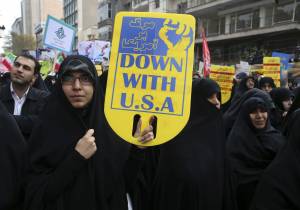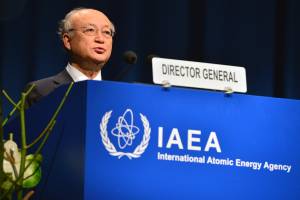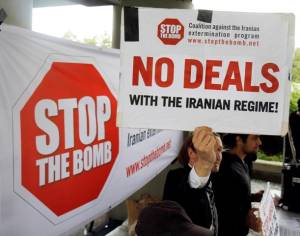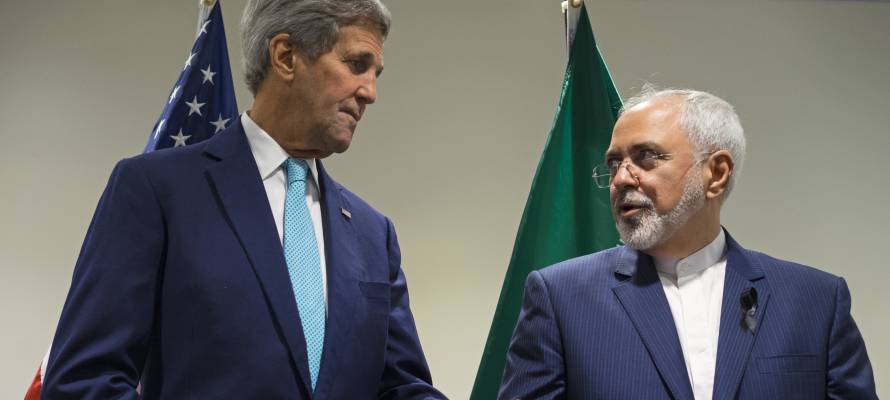As a possible Implementation Day approaches, sniping is growing on all sides.
The Iran nuclear deal is entering a make-or-break phase.
As Iran prepares to announce it has dismantled its nuclear program and thus should have its sanctions lifted on what will be known as “Implementation Day” — probably in January — sniping is growing on all sides. Opponents of the nuclear deal in Congress are urging President Barack Obama not to go easy on Iran for its recent ballistic missile tests and other non-nuclear activities just to try to save the agreement. Iranian officials, meanwhile, are pointing to recent changes in U.S. visa laws as a potential violation of the deal, saying the new rules will damage Iran’s economy by penalizing legitimate business travelers and innocent Iranian dual nationals.
If Implementation Day comes and goes without a problem, it will bolster Obama’s theory that diplomacy is worth trying even with a longstanding U.S. nemesis. If it is delayed significantly or scuttled completely, it will damage a major piece of the president’s foreign policy legacy.
The nuclear deal’s skeptics are not backing down. Republican lawmakers, along with some Democrats, are expected to press legislative efforts to punish Iran for a range of alleged misbehavior, including its recent testing of ballistic missiles. Proposed legislation tackles everything from the finances of the Iranian Revolutionary Guard Corps to the right of U.S. states to level their own sanctions on Iran. Lawmakers also are likely to try to renew the Iran Sanctions Act, which expires at the end of 2016, early in the year.
Many of the proposals will likely go nowhere and some are symbolic at best. Still, even making some noise on Capitol Hill could send a strong signal to Iran that America is not its friend, no matter how wedded the Obama administration is to the nuclear deal. It also gives Republicans a chance to look strong and bash Obama during a presidential election year.

An Iranian demonstrator holds an anti-U.S. placard. (AP/Vahid Salemi)
“One area that we all agree on is the need to be tough on any destabilizing or illegal action by Iran,” Senate Foreign Relations Committee Chairman Bob Corker, a Tennessee Republican who opposed the nuclear deal, said during a hearing Thursday. “Failure to impose any consequences on Iran for its violations of U.N. Security Council Resolutions and other destabilizing actions sets a dangerous precedent before implementation of the nuclear agreement, when sanctions are lifted and the leverage shifts to Iran.”
Obama administration officials say they are keeping a close eye on all of Iran’s activities in the region, including its role in the Syrian civil war. But the officials stress that the nuclear deal must be dealt with separately.
An October ballistic missile test by Iran, for example, violated a U.N. resolution, but not the terms of the nuclear deal, the officials say. The U.S. has pledged to respond to that missile test and a subsequent one reported in November. The nuclear deal’s critics, however, are convinced that China and Russia will use their U.N. vetoes to prevent any meaningful punishment of Tehran. Even Obama’s allies are worried: 21 Democratic senators wrote a letter to the president last week urging him not to back down on the missile dispute.
The deal’s skeptics also see the White House’s suggestions that Congress should wait until the end of 2016 to renew the Iran Sanctions Act as a sign that it is worried about spooking Iran before Implementation Day. After all, the act’s renewal wouldn’t have much real impact anyway — the president can waive relevant sanctions in it to abide by the nuclear deal.

IAEA Head Yukiya Amano speaks at the 59th General Conference. (IAEA)
Critics and supporters of the nuclear deal also are at odds over the implications of a report released this month by the International Atomic Energy Agency — the UN’s nuclear watchdog — that suggested Iran had a secret nuclear weapons program until 2003 and kept up weapons-related work until 2009. The Obama administration has downplayed the report, which was mandated by the nuclear deal, saying it revealed nothing surprising. Detractors of the nuclear deal say the report shows that Iran has a history of lying and that it cannot be trusted.
The Iranians have always maintained their nuclear program is peaceful, but they agreed to curb it in hopes of casting off sanctions that have crushed their economy. Iran also holds parliamentary elections on Feb. 26, and if the sanctions are lifted by then Iranian President Hassan Rouhani and the moderates who support the nuclear deal are expected to benefit. The elections are believed to be a reason Iran is moving so quickly to dismantle its nuclear infrastructure.
Since the nuclear deal formally took effect on Oct. 18, so-called Adoption Day, Iran has removed thousands of centrifuges and begun reducing its stockpile of enriched uranium, State Department officials say. Most, probably close to all, of the 25,000-pound uranium stockpile will be shipped to Russia, which has experience handling such materials. Iran also is expected to destroy the core of its Arak nuclear reactor in the coming days.
IAEA inspectors are monitoring the process, and U.S. officials said that so long as the Iranians take all the required steps, they can go as fast as they want. “They have a motivation to get things done,” a State Department official said, adding,”The only time Implementation Day will come is when the IAEA will verify that they’ve taken the steps they need to take.”
The Iran deal’s implementation is being overseen in the U.S. by Stephen Mull, a State Department official with the title of “Lead Coordinator.” Mull and several staffers assigned to him at State have been working with the White House, other departments and international partners. So far, America’s end of the deal involves a lot of paperwork.
Obama has issued waivers on congressionally mandated sanctions on Iran — waivers that take effect on Implementation Day. He also has directed his Cabinet officers to prepare for those lifted penalties. A new executive order is being prepared to repeal past executive orders that imposed some sanctions on Iran. U.S. officials also are preparing FAQs and other documents that explain the changes to business leaders and others.

Protesters against the deal with Iran. (AP/Ronald Zak)
For the most part, U.S. businesses won’t be able to take advantage of the more open Iranian market because the U.S. will keep in place decades worth of non-nuclear-related sanctions, such as those that target Iran’s human rights abuses and its sponsorship of terrorism. Much of the sanctions relief provided by the U.S. will instead be on foreign companies that will now be allowed to do business with Iran without fear of being penalized by the U.S.
The preparation ahead of Implementation Day has meant ongoing direct contact between American officials and their Iranian counterparts. The meetings, held in English, are focused and “pretty wonky,” although occasionally suspicions surface, the State Department official said.
“We don’t have a diplomatic relationship with Iran, officially, and there is a history of mistrust,” the official said. “It just takes some time to explain that things that we either need to do for our own domestic legal purposes or things that we need to clarify on what they need to do on nuclear technical issues, it’s not because we’re necessarily out to punish or because we have some ulterior motive. … More often than not, when you explain it they ultimately understand.”
One issue that has angered Tehran is changes to the U.S. Visa Waiver Program passed into law this month. The changes eliminate the possibility of visa-free travel to the U.S. from citizens of 38 countries, many of them European, if they have visited Iraq, Iran, Syria or Sudan since March 2011; they also bar visa-free travel for citizens of those 38 countries if they happen to be dual nationals of Iraq, Iran, Syria or Sudan, a broad category that includes many people who may have never been to those four countries. The stated goal is to stop terrorists with Western passports from reaching the U.S.

IAEA inspectors at the Natanz facility in Iran. (AP/IRNA, Kazem Ghane)
As part of the nuclear deal, the U.S. committed to refrain from policies that are “specifically intended to directly and adversely affect the normalization of trade and economic relations with Iran.” But Iranian officials view the new visa laws as damaging to their economy because they could scare off investors. Iran’s foreign minister Javad Zarif has called the new restrictions “absurd.” Some European officials also have warned that the changes could violate the nuclear deal.
In a letter to Zarif over the weekend, Secretary of State John Kerry insisted the U.S. was committed to the nuclear deal and that the visa changes would not be a problem because the U.S. could issue waivers or long-term business visas to individuals who might be affected. Obama administration officials also note that the words “specifically intended” in the nuclear deal give the U.S. cover when it comes to justifying the visa laws.
But Iranian leaders haven’t been mollified. Some suggested Monday that lobbying by Israel — a staunch foe of Iran and the nuclear deal — prompted the new visa rules. Many Iranians aren’t buying that their country isn’t being singled out, asking why Congress targeted Iran but not Saudi Arabia or Pakistan in a law ostensibly aimed at stopping terrorism.
At the same time, Kerry’s assurances to Zarif have spurred anger in Congress, where skeptics of the nuclear deal abound. On Wednesday, House Majority Leader Kevin McCarthy (R-Calif.) and other top House Republicans released a letter to Kerry and Homeland Security Secretary Jeh Johnson in which they insisted that the administration not give Iran any free passes. “The problem is with Iranian actions,” they wrote,”not the new visa waiver law.”
By: Nahal Toosi, Politico










